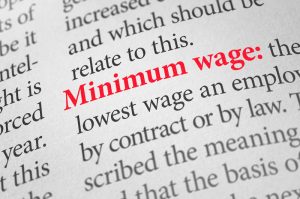Minimum Wage – understanding it

Deciding on a rate of pay for your employees is never easy. Finding the right balance between what you can afford and what your employees are worth can be difficult. Regardless, there are certain laws you’ll need to abide by when it comes to how much you pay.
In this article, the Burton Beavan team will explain what the National Minimum Wage is, who is entitled to it, and what you can do to make sure you pay staff the right amount.
What are the National Minimum Wage rates?
In the UK, there are different minimum rates of pay depending on your employees’ individual age brackets. These rates are altered by the government each year in order to keep minimum wages in line with inflation.
The National Minimum Wage applies to those aged between sixteen and twenty-four within three different brackets.
Employees of school leaving age, i.e. between sixteen and seventeen years old, must be paid at least £4.20 an hour. Eighteen to twenty-year-olds are entitled to at least £5.90 an hour.
Those aged between twenty-one and twenty-four must be paid a minimum wage of £7.38 per hour. This rose from £7.05 last year and is often the rate people think of when speaking about the national minimum wage.
Once over twenty-five years old, workers must then be paid the National Living Wage. This currently sits at £7.83 an hour and applies to all employees aged twenty-five or older.
Any employment contracts stating payments below the minimum wage are not legally binding. Doing so could trigger an investigation by HM Revenue and Customs. If you’re found guilty, you could be required to pay both the money you owe your staff as well as a penalty of 200% of the total underpayment per employee paid under the minimum wage to HMRC.
What is the minimum wage for apprentices?
If your company hires apprentices, they are entitled to a lower national minimum wage. That’s because they receive funded training as part of their course along with their monthly pay.
In 2018, the minimum wage rate for an apprentice is £3.70 per hour. This applies to all of your apprentices aged under nineteen as well as those over the age of nineteen who are in the first year of their apprenticeship.
Apprentices aged nineteen or over who have completed their first year must then be paid at least the national minimum wage rate for their age.
Who qualifies for the National Minimum Wage?
Your employees must always be paid the correct minimum wage for their age, including those who are:
- Part-time staff,
- Casual labourers, such as those only hired for a single day’s work,
- Agency workers,
- Workers paid by the number of items they make,
- Trainees,
- Apprentices,
- Workers on probation,
- Agricultural workers,
- Foreign workers,
- Offshore workers, and
- Seafarers
Who does not qualify for National Minimum Wage?
Not everyone is qualified to receive either the National Minimum Wage or National Living Wage.
For example, if you are self-employed and running your own business, you are not entitled to receive them. That’s because you are your own boss and your income will depend on how much work you are able to complete. Company directors are also not legally entitled to receive the minimum wage.
Other types of worker who do not qualify for the National Minimum Wage or the National Living Wage include:
- Volunteers and voluntary workers,
- Workers on government employment programmes like the work programme,
- Family members of the employer living in their employer’s home,
- Non-family members living in their employer’s home who share in both work and leisure activities, are treated as one of the family, and are not charged for meals or accommodation, such as an au pair or nanny,
- Members of the armed forces,
- Workers younger than school leaving age (sixteen),
- Higher and further education students in the first year of their work placement,
- Workers on government pre-apprenticeships schemes,
- People on certain European Union Programmes including Leonardo Da Vinci, Youth In Action, and Erasmus,
- People working on a Jobcentre Plus work trial for 6 weeks,
- Share fishermen,
- People living and working in a religious community, and
- Prisoners
Want to find out more?
For more information on the National Minimum Wage, you can visit the ACAS website.
Employers have plenty of responsibilities when it comes to paying your staff fairly. For help organising your payroll and ensuring your business is compliant with all employment regulations, speak to Burton Beavan on 01606 333 900 or email hello@burtonbeavan.co.uk.


